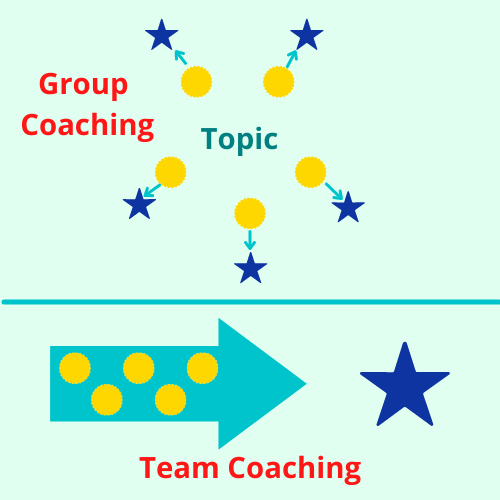
| Group Coaching | Team Coaching |
| Individuals who come together with a common interest but do not always have the same goal in mind (e.g., completion of a specific project) | Individuals who are all aligned and headed to a common goal or outcome (e.g., coached on strategic leadership) |
A well-designed study of group coaching (a group of individual employees, distinct from team coaching involving an active team) in a large organization concludes that group coaching creates a supportive space which leads to improved self-awareness, self-acceptance and confidence, all together uplifting work proactivity and engagement.
In a recent research conducted by Harvard, twenty-four employees (14 female, 10 male) from a large multinational financial company volunteered to take part. Entitled “Becoming your own CHO (Chief Happiness Officer),” the group coaching program had two goals: increase clients’ self-awareness and self-regulation, and help them create a personal development and happiness plan.
The intervention included multiple activities: pre-work, readings, group sessions, and time for personal reflections/writing. The content was a combination of practical examples, group and individual exercises, and individual coaching. The program consisted of two, day-long training and coaching workshops, separated by at least a week, with homework before each of the workshop days.
In considering how to measure outcomes, the researchers drew on prior definitions:
- Self-awareness as “the extent to which people are consciously aware of their internal states and their interaction or relationships with others” and
- Engagement as “having energy and enthusiasm for work while demonstrating focused effort.”
The quantitative study results showed a significant improvement in self-awareness, self-acceptance, and proactivity and engagement at work. Notably, participants also reported a significant decrease in the emotional costs associated with self-awareness.
The researchers summarize the qualitative results: “Clients noted the importance of both their improved self-awareness and their learning of specific tools and techniques in developing their concrete action plans for improving happiness. Further supporting the quantitative measurements, clients reported a greater appreciation of their current situation and improved confidence, as well as highlighting the importance of having the supportive space to explore their self-development. Previous work has noted that increased self-awareness can lead to improved self-esteem and confidence, and this was confirmed in both the quantitative and qualitative results here.”
The researchers described their intervention as including both “training” and “group coaching,” and this opens a discussion around the importance of combining training and coaching components to optimize effectiveness, and the requisite skills of the coach in delivering both approaches together.